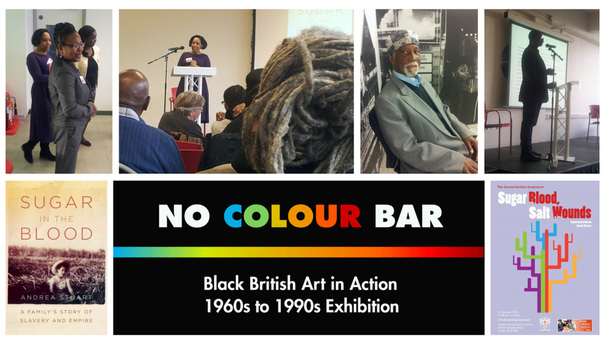|
Sugar in the Blood; Balanced, Salt in the Wounds; Cleaned.
Saturday 21st February was a day of roots and culture. I had the great pleasure of attending the Second Huntley Symposium “Sugar in the Blood, Salt in the Wound”; Exploring Caribbean Family History at the London Metropolitan Archive. Apart from sharing with you highlights from a rare and special kind of gathering I also feel I must write on this to heal the fact that I've missed the first Huntley Symposium and the first nine Annual Huntley Conferences!!! Life sparing I'll be at the tenth for sure (31st October @ Guildhall Art Gallery). Andrea Stuart, author of Sugar in the Blood: A Family's Story of Slavery and Empire, gave a touching keynote address, giving her voice to the words of her book that had so clearly moved most of the hundred plus gathering who mostly stayed for the whole day. You can imagine how challenging it has been for these stories to come to public view, the blood of enslaved Africans used to sweeten millions (if not billions) of cups of tea Britain and Europe wide. With the many diabolical processes of destruction heaped on African persons, families, communities and nations, it's impossible to remember in its fullness, yet clearly its remembrance is vital to future development. Now not only for African peoples but for people globally, and given the place and time of this symposium the gathered saw the vitality of remembrance for Britain's correction of policy, future development and healing. That said even today media such as the Guardian would still seem to take umbrage with Andrea's correlations of the African Maafa (holocaust) and the holocaust of the Jews under the Nazis. Why? Is it not now highly evident that the African holocaust involved more destruction of peoples, their cultures and descendant’s true life potentials than any other holocaust of world history? Well I, for One, congratulate Andrea for taking up the African agency (voice) to speak upon our past heritage in knowledge of its undeniable resonance in all our lives today and tomorrow. This is, of course, one relatively small stage (time wise) in African history, let us never forget though the profound pivot it has effected. Guy Grannum of the National Archive gave an interesting and information rich glance through the way and quality of records kept by the nations in regard to military service women and men of the Caribbean. His presentation showed how the underlying stories of the past start to shine clearly through the records, as fragmented as some of the records can be. Patrick Vernon, a leading expert of African & Caribbean genealogy in the UK shared his story of tracing his family, the Shirley of Jamaica. From his presentation many points touched me and connect to the work of the Trust. As an example he spoke of the rarity of family gatherings to explore family heritage and story and this rang a bell for me regarding the Trust's insight to child and family safeguarding where there is a profound need for family support to facilitate multi generational family gatherings to support the young and the family unit itself. This is a strand of preventative services that our Trust is committed to. His personal knowledge and insight to DNA technologies applied to genealogical family heritage studies was very interesting too. Yes it really was a day of deep roots and culture, its foundation being the pioneering works of Eric and Jessica Huntley, who for over 50 years participated in many significant grassroots campaigns pivotal to challenging Britain’s practical ignorance of racial equality and educing more value for diversity from within and around Black communities. Let me spell out this lineage in simple terms; Abundance Centres (UK) has been seeded by Schools Of Unified Learning (SOUL), which was seeded by the Ka-Zimba Ngoma Academy, which was seeded in the early works of the Huntleys. So you can imagine my pleasure at being in this event with all gathered yet most specially Eric Huntley (founder of Friends of the Huntley Archives at LMA aka FHALMA) and Hamzah Muhammad (co-founder of the Ka-Zimba Ngoma Academy). Something like the completion of a cycle took place as I reasoned with Margaret Andrews (Chair of FHALMA) and Sharon Williams one of their highly active and outreaching members. The lunch reasoning with the great artist Michael McMillan (writer, playwright, mixed-media artist, curator and academic) was fun. I'm determined to find out more on how he correlates dub and jazz, but more relevant to the point of our gathering he is rebuilding and art installation of the Walter Rodney Book shop to not only capture the physicality of this historic landmark place but also the dynamic. This is part of the No Colour Bar / Black British Art in Action: 1960s to 1990s exhibition project by FHALMA which has received initial support from the Heritage Lottery Fund. There's a lot happening around this project, the bookshop installation will be launched on the 7th July 2015. And there's more. By serendipity I was asked to support the concluding dynamics of the symposium so I found myself, drum in hand with Ras Chauncey, Eric's son, to the right, Keith Waithe (the renowned flautist I had just recently heard on the BBC's Forum expressing ideas of blackhole science and rhythm with his instrumental insight) to my left and the ever wonderful storyteller Sandra Agard on the floor enrapturing the gathered with a story of nobility, humility and wisdom. As we do, the sugar in the blood and the salt in the wounds were eased with a song and a dance. by Astehmari Batekun Executive Member (Chair) Abundance Centres (UK)
Comments
|
Blog TeamMembers of the Trust and our Co-ops share insight, experience and visions of the future. Archives
August 2016
Categories |
- Home
- What is learning?
-
Courses & Resources
- Unifiedknowledge: Foundation Course One >
- Level Being 9 - Preparations for Mastery >
- Hair Structures & the Alpha Helix Design
- Dankira Tehwagi (African Warrior Dance) >
-
Creative Learning Festival
>
- Dark & Wild – Black Sci-Fu – The Future of Black Knowledge
- Event 1 - Pop-Up Community Science Lab - Inside Chestnuts Park (#BSW20)
- Event 1 (Compliment) - Share in a Ghanaian (Karibu “Welcome”) Meal with our cooperative members and staff teams.
- Event 2 - Learning STEM with African Drumming – Masterclass led by Astehmari Batekun
- Event 3 - What’s the Big Idea? - Introducing the Big Ideas of Mathematics (with spoken word, music and movement)
- Event 4 - Learning STEM with Dance – Masterclass led by Astehmari Batekun
- Event 5 - High Altitude Balloon (HAB) LAUNCH EVENT ! - Journey with us to the stratosphere (outerspace!)
- Event 6 - Introduction to Financial Intelligence (by Morlai Kargbo) and Cryptocurrency trading for children, youth and their families (with uLearn Naturally).
- Event 7 - A Dance Revival of the Teacher & Learner Within Innovative African Dance Masterclass Special led by Francis “Angol Movement” & Astehmari Batekun
- Event 8 - Learning STEM through Football (and other athletic games) - sports professionals and STEM educators in discussion.
- Event 9 - CSI Haringey – Crime Scene Investigation workshops and presentations with STEAMPower
- Social Gatherings (Dark & Wild)
- Enrolment & Instalments
-
Other Resources
>
-
Projects & Partnerships
-
Member Trusts
- The African DAO
|

 RSS Feed
RSS Feed
